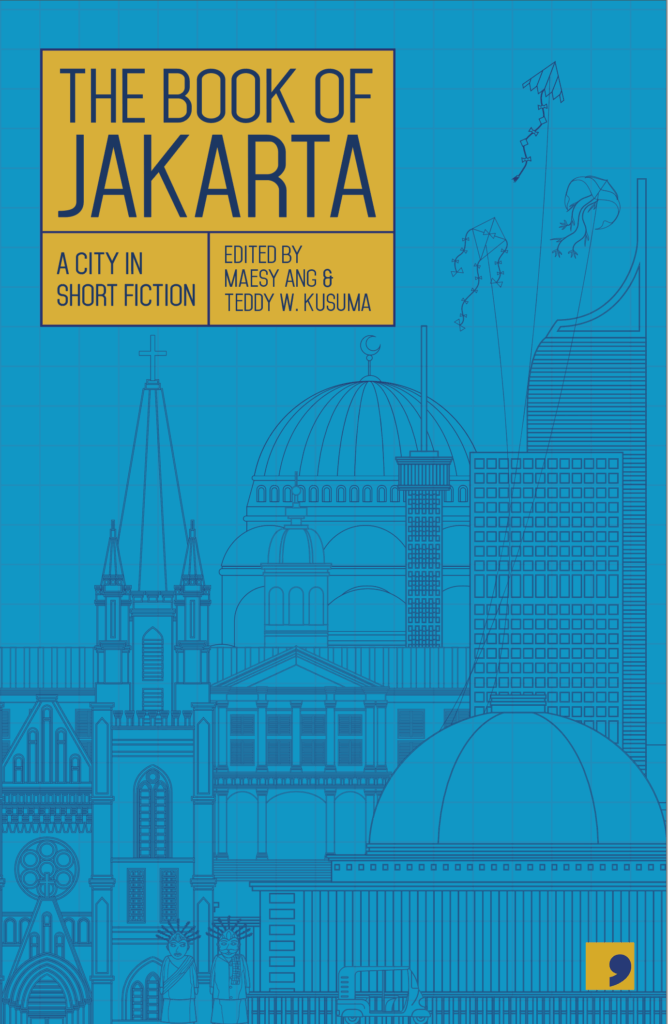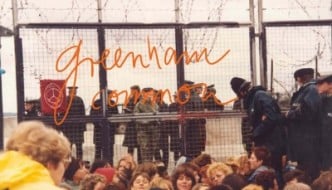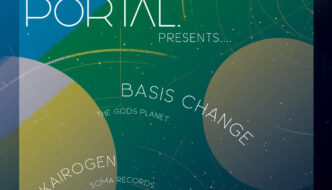NFA Column: Matt Abbott in conversation with Ratri Ninditya and Mikael Johani
December 21, 2020

This month’s NFA Column is a real festive treat. On the occasion of Comma Press publishing ‘The Book of Jakarta’, an anthology of short stories, our regular spoken word columnist Matt Abbott talked to Ratri Ninditya and Mikael Johani – two writers from Jakarta who contributed to the anthology. The resulting conversation is absolutely fascinating: covering Indonesia’s darkest moments; the hierarchy of the local literary world; and PavPu – Jakarta’s leading spoken word night.
As the curtain gradually closes on 2020, there’s an overwhelming amount to try and reflect on. Truth is, it’ll probably be a couple of years before any of us can truly start to process it. And whilst we’ve all been deprived of human contact, we’ve also embraced new connections through the digital age.
It’s a Friday morning and I’m sat at my kitchen table chatting to a couple of writers. This wouldn’t be out of place in many years prior to 2020. Except, we’re chatting over Zoom (which nobody had heard of) and the writers are from Jakarta (where I’ve never been). I don’t know if this conversation would ever have taken place without COVID-19, so I’m embracing the silver lining.
Ratri Ninditya is one of the contributors to ‘The Book of Jakarta: A City in Short Fiction’. The anthology was published here in the UK by Comma Press this month. According to Ratri, it showcases the “diverse background and landscape of Jakarta”. It also contains a “subtle – or maybe not so subtle – criticism of the ‘developmentalism’ of the city.”
Whenever we discuss Jakarta, or the wider Indonesian literary scene, the light and shade are always held aloft, side-by-side. Mikael Johani, who helped to translate the anthology, paints a vivid and visceral image of Jakarta life. He describes zipping in and out of the bustling traffic on a scooter as heavy rainfall blurs the city’s neon. It sounds beautifully chaotic: a real love/hate relationship which all citizens have with the place.
This relationship is perfectly captured in Ratri’s short story in the anthology. Starting life as a Tumblr post back in 2012, it’s a contemporary cult classic on Jakarta’s alternative literary scene. Before long, it was widely discussed on social media and then also at events, at parties, and around Jakarta in general.
Ratri’s story had never been officially published until now, but the team behind ‘The Book of Jakarta’ knew that it need to be included. This is testament to Jakarta’s thriving and independent scene. And whilst it’s currently with the rest of the world in its binary divides, it clearly has a unique spirit at its core.
Partly thanks to our dependence on social media during various lockdowns, identity politics currently rule the roost in Jakarta. So much so that it almost supersedes the quality of the art itself for some writers. Western Indonesian versus Eastern; Jakarta vs elsewhere; urban vs rural; hetero vs queer. These are all divides which have flooded the discourse, but it’s a common phase.
“We have a lot of problems going on inside the literary scene,” says Ratri. “The space is very limited. Especially poetry: even more limited. And within that small space, everybody’s just fighting to be successful within than tight space. And they are all just competing. So, it’s all about the competition now, and not about the collaborations or the community.”
Mikael offers agreement with a knowing smile. He adds that, as well as the in-fighting, Jakarta writers overall are often mocked or even slated as being too spoilt and too privileged. The derogatory nickname of ‘Javakarta’ presents them as the black sheep of the wider Indonesian scene. And all of this means that the timing of ‘The Book of Jakarta’ is beautifully contentious.
Whilst undoubtedly set to ruffle a few feathers amongst Indonesia’s gatekeeping establishment, it also offers up an alternative perspective. “Jakarta has sometimes rightly or wrongly been seen as a domineering or dominating scene,” says Mikael. But this book will shed a positive, more nuanced and complex light on Jakartans and Jakarta writers and hopefully go some way to combating that.
Both Mikael and Ratri are unfazed by any derision that the book might receive from these gatekeepers. They’re entirely comfortable in the knowledge that these are stories which need to be heard by the entire world.
A lot of the things that we discuss resonate with the UK scene. Identity politics, fierce competition on social media, literary gatekeepers, and a hierarchical mainstream establishment. However, some things are in stark contrast, and put things firmly in perspective for us UK poets.
Mikael explains how there’s still a “hangover” in Indonesia from the mass killings of communists in 1965-66. Many leftist writers were exiled, murdered, or imprisoned for lengthy periods without trial. As a result, mainstream Indonesian literature has been following a more abstract or pastoral style.
The more political protest poetry has therefore been ostracised and not considered to be “the accepted style”. There have always been poets who’ve spoken out against politicians and the ruling establishment, but often at their peril. Widji Thukul was a prominent left-wing poet in the ‘80s and ‘90s and is now one of their “disappeared”. He’s been missing, presumed dead, since 1998.
Encouragingly, this has started to change over the last decade or so and poets now feel a lot freer. That said, it’s far more likely to be the literary hierarchy that they’re rallying against nowadays, as opposed to the political establishment.
Some writers who attack Jakarta for being ‘domineering’ have a significantly bigger profile than any individual Jakartan writers themselves. Their digs at Jakarta are often seen as being tokenistic and as taking an easy swipe.
Then there are the older literary gatekeepers who have been in place since the late ‘60s and early ‘70s. These gatekeepers, as expected, have close relationships with most of the Western funders. Not surprisingly, they often self-exoticise Indonesia and mock the more urbanised, playful Jakarta poets as not weighty enough.
Mikael recalls an experience when he was chosen to travel to the UK for the 2019 London Book Fair. He was asked to translate a story about Papua which was in fact written by a Javanese writer. Some of the dialogues even attempted to mimic the way that Papuans speak but were entirely inaccurate. Papuans see the Javanese as their colonisers. And yet, this is how Indonesia is being showcased – and the de facto leader of the Indonesian delegation was actually an American – on a more global stage such as London.
This problematic approach underlines the major flaws in Indonesia’s literary establishment. They claimed that they were being representative by including this Papuan story, which again only further underlined the flaws. Mikael explained: “Being there in the London Book Fair: there’s just hundreds of years of chains of colonial pain I was forced to be a part of.”
One way that this is being combated is through leading Jakarta spoken word night Paviliun Puisi; often shortened to PavPu. It’s been running since 2017 and attracts a wide range of writers and audience members as well as first-time performers.
Mikael and Ratri jokingly claim that it’s the cheap booze that attracts their punters. But it’s clear that this is a unique and dynamic event which every literary scene desperately needs.
Mikael: “I think people are attracted to the freedom; I suppose. Because we deliberately have absolutely no censorship: nothing. Absolutely no censorship. You can use any language you want. A lot of people think that if you get into poetry in Indonesia, you need to read or write it in what we call ‘the good and proper Indonesian’. But we tell people, no: you can use any language.”
This has so far included Russian, Tagalog, French, Catalan, and regional languages from elsewhere in Indonesia, as well as the ubiquitous Jakarta slang and English. The freedom also extends to subject matter. Mikael: “What we do is art. So, in art, you can’t have censorship. I mean, if you say something which is bit controversial, you should expect questions from the audience! But that’s fair enough: you can defend your own work. That’s the freedom that we try to give to people.”
At the last physical PavPu event before the pandemic, a queer academic read for the very first time. And from the confidence boost, and through experiencing that space, he’s subsequently had a poetry collection published, having been writing privately for years.
Ratri expands more on the language shared at PavPu. “Poetry should reflect our daily lives. It’s about our lives, so the language should be written in the way we speak.” She explains that for the Jakartan poets, this can mean broken English, informal English, local dialect, and more.
Particularly amongst the Gen Z poets, English and codeswitch are the dominant languages at PavPu. Whereas for Millennials (and older generations), it would be Indonesian. And whilst Gen Z do watch content such as Button Poetry on YouTube, a significant factor is also the fact that they’re influenced by Hip-Hop.
Having grown up watching US TV series also plays its part. One key example is Indonesian rapper Rich Brian, who achieved fame around the globe – including in the US – through rapping in English. This prominent use of English at PavPu is also seen as a way of breaking down various barriers – be them literary, political, geographical, or even personal.
I was curious to know how poetry is generally considered in mainstream Indonesian culture. As it turns out, amongst the book-buying scene, poetry is huge: some of Indonesia’s best-selling authors are poets. But, like the UK, they’re “old, male, straight…”.
There’s also a lot of the romantic and arguably simplistic brand of poetry as has been spearheaded by Rupi Kaur. Mikael has himself dubbed them “the Hallmark generation” of poets. So, when you tell somebody that you’re a poet, they won’t shun you as quickly as they might in the UK, but they’ll instantly presume that you’re that kind of poet.
One poet’s work went from Instagram posts to coffee table book to Netflix film. So, as an alternative poet, there’s also that barrier to contend with as well. But nights such as PavPu provide a space where people don’t feel too intimidated to share their work or feel held back by preconceptions.
This enforced digital phase of PavPu has had significant benefits. Many of their Zoom attendees are from outside of Jakarta and have always been desperate to attend the night. This includes a lot of young queer people from outside of Jakarta who don’t have any queer spaces. So finally, with PavPu being online, they have a space for their stories; their rants; their experiences.
One example was a young queer poet from Padang, which is a city in West Sumatra – one of Indonesia’s more conservative regions. He had to share his poetry almost with a whisper, through fear of his parents overhearing. Poets like him seeing their work being read and listened to is a truly transformative experience. For this reason, PavPu will almost certainly continue doing some Zoom events, even when they return to their beloved venue.
One aspect that’s sorely missed, however, is the physical and collaborative element of PavPu. From the off, they’ve always worked with musicians, graphic artists, dancers, actors: it’s a very physical, cross-artform space. This provides a haven for creatives from across various personal and artistic spectrums to come together and share their ideas and their processes.
One performer, Cyntha Hariadi, whose short story is also featured in The Book of Jakarta, marinated a chicken carcass on stage whilst reading her work about the body. Mikael jokingly quipped. “It was like Uncle Roger and Adrienne Rich in one!” She then produced a pre-cooked chicken, cut it up and distributed it amongst appreciative audience members.
The PavPu organisers don’t want to be perceived as being ‘uber woke’ or having the opinion that “everywhere else is primitive or conservative.” In the grand scheme of things, this is a relatively tiny event which does what it can to provide a space and provide freedom. It’s not about being a “rebel space” or being ‘holier-than-thou’. It’s a lifeboat in a storm, and a place to thrive, express, connect, and escape.
“We try to show people that poetry can be done in many ways,” explains Mikael.
They regularly host themed nights: Greed, Dys/Utopia, Ramadan Realness, Hard Labour, Powder Over Power. They’re all about broadening horizons and introducing new ideas against the backdrop of the incredibly uniform Indonesian literary scene. Their whole aim is simply to show people examples of what they can potentially create.
They’ve also dedicated a night to the ‘disappeared’ leftist poets of decades gone by. It’s a fitting tribute to inspire the next generation of alternative poets. And if there’s one thing I’ll take from 2020, it’s this introduction to Jakarta’s stories.
The ‘Book of Jakarta‘ is published by Comma Press and is out now.
Filed under: Written & Spoken Word
Tagged with: Binary, Book of Jakrata, covid19, divisive, event, Identity, Indonesia, interview, Jakarta, literature, Matt Abbott, Mikael Johani, online, PavPu, poet, poetry, politics, Ratri Ninditya, safe space, spoken word, translator, writer



Comments